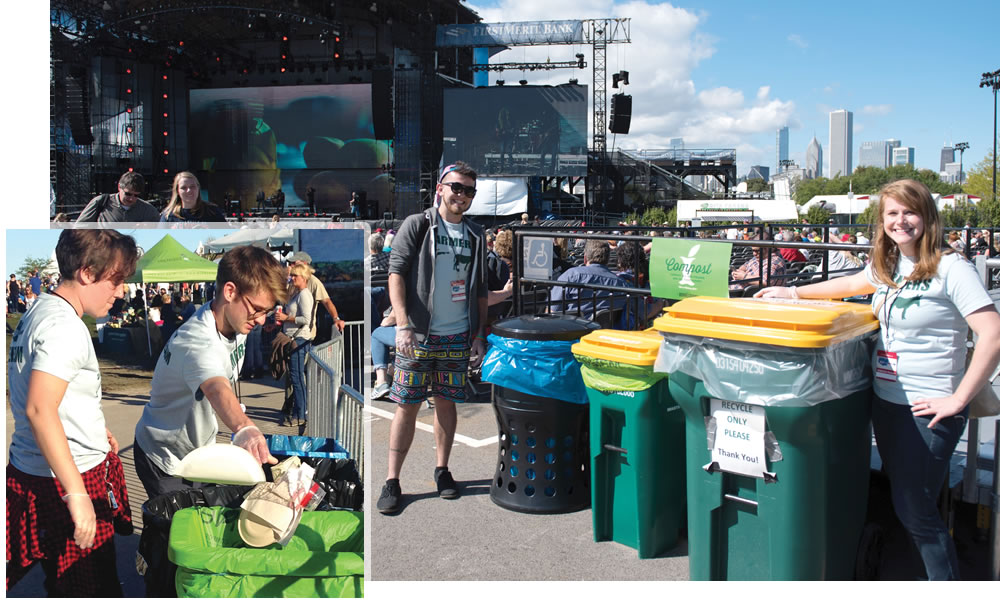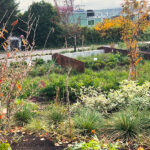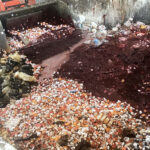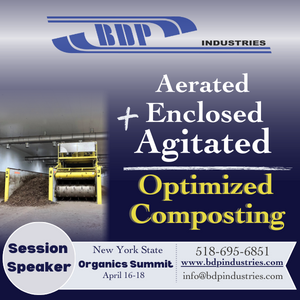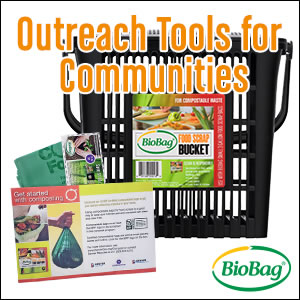Stephanie Katsaros
BioCycle January 2016
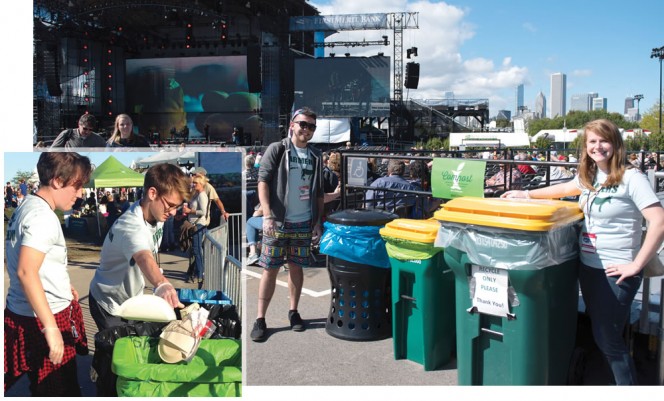
Farm Aid’s 30th Anniversary Concert was held at the FirstMerit Bank Pavilion at Northerly Island last summer. It was the venue’s first experience collecting a compostables stream (green bin with green bag, above and at left). Farm Aid requires that all food service items coming into contact with food be compostable. Main photo by Sabine Carey, Freeranging Photography, Inset photo by Stephanie Katsaros
Farm Aid’s 30th Anniversary Concert, Farm Aid 30, was held in Chicago last summer at FirstMerit Bank Pavilion at Northerly Island, a seasonal venue operated by Live Nation on land owned by the Chicago Park District. Over 27,000 concertgoers, staff and guests attended the nearly 12-hour event. Farm Aid uses its annual concert and fundraising event as an invitation to experience and participate in agriculture. Joined by his fellow Farm Aid board members, John Mellencamp, Neil Young and Dave Matthews, Willie Nelson put it simply at Farm Aid’s press event: “If you eat, then you should be concerned about helping the guy who is growing our food, the farmer.”
Musical artists donate their performance to Farm Aid, allowing revenue to cover production costs, with the rest going to support Farm Aid’s ongoing charitable endeavors. “People’s hearts and minds are changed by shared experiences with music and food,” notes Glenda Yoder, Farm Aid’s Associate Director. Beyond the music, Farm Aid concerts include a HOMEGROWN Village, filled with a diverse mix of exhibitors and hands-on farm and food-related activities about soil, water, energy and more— building relationships between farmers and supporters of the good food movement, and introducing them all to local and national resources and community organizations.
Farm Aid is distinguished as the first major concert event to ensure that food products served at concessions and catering are sustainably produced by family farmers, identified as local, organic, non-GMO, humanely raised, or utilizing other ecological practices, along with a commitment to a fair price for farmers. This is carefully coordinated through Farm Aid Culinary Director Sonya Dagovitz, who works with every vendor and the concessionaire to make sure Farm Aid’s HOMEGROWN Concessions® criteria are being followed, including use of approved compostable serviceware.
Event food service operators are required by Farm Aid criteria to use only recyclable or compostable packaging, with the goal of eventually being a zero waste event. Venues hosting Farm Aid vary in the materials they use and the processes by which they sort consumer waste, and often learn about the true recyclability and compostability of the products they are currently using by going through Farm Aid’s evaluation process. Although 75 percent of vendors who responded to Farm Aid’s post concert survey said that compostable packaging was more expensive, 100 percent ended up having a successful day — so it appears to be a trade-off with net positive outcomes for vendors.
By requiring that all food service items coming into contact with food be compostable, Farm Aid makes collection easier by conveying to patrons through signage and volunteers that they can “put it all in” the organics bin. Over the years, Farm Aid partners Anne and Derek Bedarf of the Adaptive Collective, have seen the availability go up and price go down for compostable food service packaging, and an increase overall in the infrastructure available to compost the food scraps and packaging.
Messaging and volunteers are key to minimizing contamination of organics bins used by concertgoers. Farm Aid’s volunteer green team helped reduce waste by physically sorting through it, as well as educating people on how they can sort themselves. Kara Thibault, Farm Aid’s Volunteer Coordinator, sees value in “giving sustainability a physical and influential presence, where people can see waste reduction in action, done by people like them.”
First For Venue
Already endeavoring to improve waste diversion, Brian Rutkowski, General Manager of FirstMerit Bank Pavilion and other Live Nation venues around Chicago, says the ratio of waste-to-recycling containers has increased to 1-to-1 or better, due to the recycling initiatives of tours like Dave Matthews Band, Jack Johnson and Phish. Farm Aid’s request to collect a third, compostable, stream was a first for this venue, as it has been for each of Farm Aid’s previous host venues. “It definitely took more time and effort, but was not as incrementally more expensive as one might think, because we were already doing so much in our standard operations,” notes Rutkowski.
For the first time, Farm Aid was able to use the in-house waste company, in this case Waste Management, to supply organics collection bins and do the hauling, a big change from previously having to solicit outside vendors. Rutkowski adds that seeing subcontractors separating waste and removing contamination at the public recycling and organics bins “highlighted how important this is. It was part of this event. It can be difficult if something is new or the message wasn’t relayed appropriately.”
Farm Aid’s 30’s diversion initiative took months of planning, and many partnerships. In addition to coordinating sourcing, concessions and operations with Live Nation’s and Legends’ (the food service concessionaire) local and national managers, Farm Aid met with Waste Management to strategize bin locations, source compostable can liners and facilitate access to a composting facility. These efforts resulted in the diversion of 2.2 tons of compostable material and 7.39 tons collected for recycling — though the wet, muddy weather created some added weight and contamination. About 1.25 tons of edible food was donated to the Greater Chicago Food Depository. A total of 20.25 tons were landfilled, including debris from set up and tear down.
Because Farm Aid stages its event in a different venue each year, it’s a challenge to initiate new operational practices at the chosen venue. But it also is a learning opportunity for venue staff, concessions and Farm Aid to figure out how, in each particular venue, to serve concertgoers HOMEGROWN food and strive for a zero waste event with composting and recycling. As the overall concert industry aims for greater environmental efficiency, events like Farm Aid will have an easier time aiming for Zero Waste.
Stephanie Katsaros is founder of Bright Beat, which specializes in large-scale sustainability solutions for brands, events, venues and municipalities (www.brightbeat.com).


